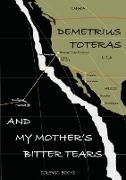- Start
- And my mother's bitter tears
And my mother's bitter tears
Angebote / Angebote:
There is no doubt that this is, to a considerable extent, an autobiographical novel. It is also clear that parts of it are fictional, but it is not possible to define with any clarity the boundary between autobiography and fiction. The author did serve in the US Army in the Korean War as an underage soldier, though he was probably not quite so young as the narrator claims to have been. The author's second name "Toteras" is his chosen nom-de-plume, formed from two Greek words "to" and "teras", meaning "the monster". The novel begins with the narrator's return from Korea suffering from what we would now call post-traumatic distress syndrome, and finding himself unable to face his family again. He falls in with a young woman who looks after him. This narrative breaks off to be resumed only in the final chapter of the book, and there follow several chapters in which his early life in San Francisco's Greektown is recounted. Conflicting demands - of their families to be Greek and of their school to become Americans - drive him and his best friend to obtain fake birth certificates, enabling them to enlist, at the age of fourteen, in the US army. Between basic training and embarkation for the Far East they take a bizarre trip to Mexico, where they become involved with a rich American couple who need to involve others in their sex-life. The two teenage soldiers are sent to the Mariana Islands where they are occupied in dismantling a World-War-Two ammunition dump. After an explosion which kills some of their colleagues, they are granted leave, and go to Japan to meet up with a sergeant (also of Greek origin) whom they had made friends with in the training camp. Through a series of mishaps they end up being sent to Korea with the first scratch-force of US troops, following the news that the North Koreans had crossed the 38th Parallel, and they are involved in the first US battles of the Korean War, battles in which the US army was repeatedly defeated with immense loss of life. The battles of Osan, the Pyongtaek Bridge and Taejon are described in graphic and horrific detail, and several subsequent battles are referred to. The novel was completed in the early 1990s, but clearly not to the satisfaction of the author, who died in 2009, leaving it unpublished. The surviving typescripts were problematic, almost unpunctuated and full of errors. They have been painstakingly edited over a number of years and some of the material in the early (Greektown) chapters has had to be rearranged to create a coherent narrative and to remove repetition. The style undoubtedly owes something to Kerouac but the content is far beyond his scope, as it brings us face to face with the insanity and the horror of war and the nature of fear, but it is not without humour, and much of the humour has to do with sex. In this the narrator and his buddy are opposites: the narrator a romantic innocent, his buddy precocious and sex-mad. Although, as noted, the narrative of the weeks after his return alone from Korea is resumed in the concluding chapter, there is no conclusion, for we are left with a final moment of dramatic suspension, not knowing what exactly has just happened and with no clue as to what the narrator's future will be.
Folgt in ca. 10 Arbeitstagen
